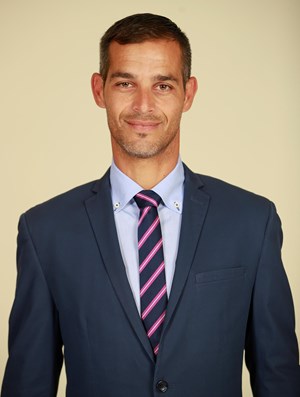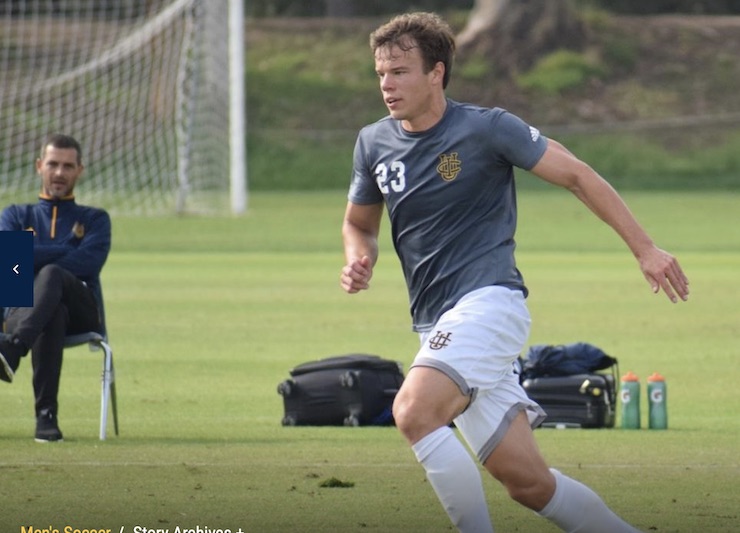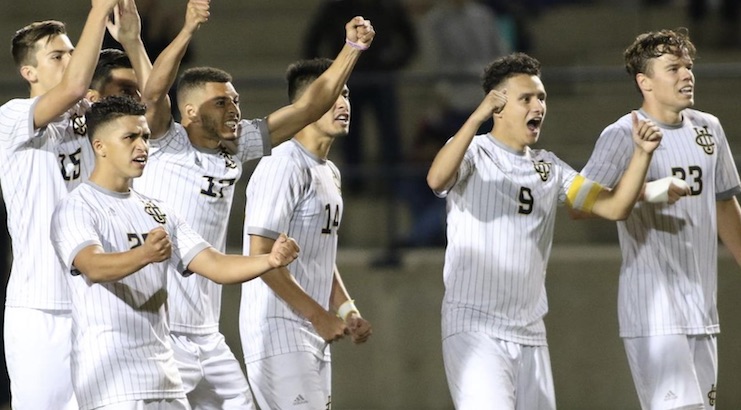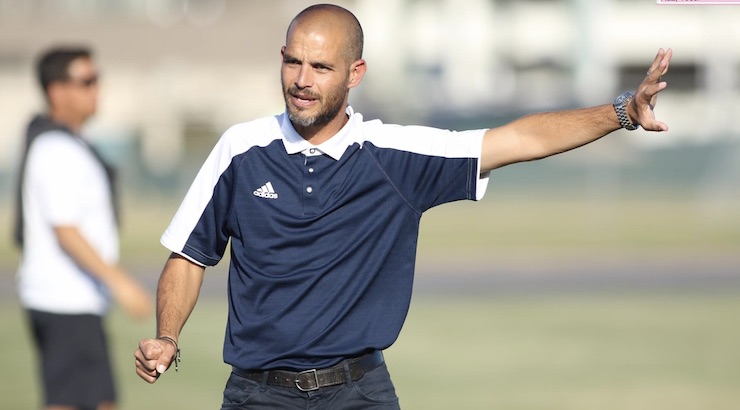Making an Impact in Collegiate Soccer
UCI’s Head Coach Yossi Raz On What He Looks For In A Player
UC Irvine is a DI college competing in the Big West Conference and is currently ranked #29 with a record of 11-6-4. The program is led by Head Coach Yossi Raz who took over the guidance of the Anteater program in 2017 as the fourth head coach in UCI men’s soccer history after four seasons as head coach at Cal Poly.
Raz has recruited talent for the U.S. Youth National Team as a scout and coach. Born and trained in Israel Raz was on the Israeli Youth National Team as a young player before coming to the USA and attending CSUN where he was a student-athlete for 4 years followed by 9 as an assistant coach.
SoccerToday Interview with UCI Head Coach Yossi Raz
Diane Scavuzzo: What is your philosophy as a collegiate men’s soccer coach?
Yossi Raz: As a coach, I’m very human-centered first, then soccer second.
I’m trying to make sure that people are growing humanistically with the right habits.
Diane Scavuzzo: What do you consider to be the right habits?
Yossi Raz: I find a clear correlation between people off the field and their success on the field.
For example, I care about study habits but in a playing environment, it’s more about how a player comes to practice? Are you prepared? Are you shaking hands, looking at people’s face? Are you a good member of the organization? Are you contributing to the organization outside of the lines? Another example is do you care about how you speak with your parents?
I believe that this all goes hands in hands. I am probably different from most coaches.
Diane Scavuzzo: What are the soccer-specific habits you look for in a player?
Yossi Raz: There are a lot of aspects that I care about on the field.
- I like to be the aggressor, and the initiator, as a team.
- Both on the defensive end and on the attacking end.
- I like to play position-style football through lines. But I also want to make sure that there are many vertical elements to my team’s performance.
The speed of play is also very important and it’s not necessarily how fast a player is but how quickly a player can make transitions from fast to slow, and from slow to fast. And, of course, in what areas of the field.
 I like the concept of playing between lines — where you can be challenging to the opponents, and I like the ideas of players’ relationships in different channels.
I like the concept of playing between lines — where you can be challenging to the opponents, and I like the ideas of players’ relationships in different channels.
Diane Scavuzzo: What does that mean?
Yossi Raz: We divide the field into three different channels. The right, the left, and the center. And to expose opponents in the left channels, there needs to be some kind of relationship in the left channel, between different players, and how they move up the channel. And the same for the right and the same thing in the middle.
Diane Scavuzzo: How do you feel about your incoming freshmen squad? TopDrawer says, “UC Irvine’s men’s soccer program unveils its list of 10 incoming Anteaters widely regarded as the top 2019 recruiting class in Division I men’s soccer.”
Yossi Raz: I’m personally very excited about the people we invited to the program, and I’m excited that they chose to come and play UC Irvine. I see a bright future for us if we all work hard together and learn and progress. But the starting squad is very, very good.
Diane Scavuzzo: What are your goals for the team?
Yossi Raz: To self-fulfill our talent, and make sure that we’re competing for championships, while we’re graduating our athletes, and giving them a great opportunity in life.
This has always been my goal, in every organization I’ve ever worked — to better the lives of our athletes while giving them the best experience.
And, I believe that part of that experience is to be competitive and try to win trophies.

Diane Scavuzzo: Do you believe the Development Academy, or youth soccer in general, is doing a good job preparing players for you?
Yossi Raz: Yes. Definitely. It’s the college system that doesn’t prepare them well for the next level.
Diane Scavuzzo: Why do you feel that way?
Yossi Raz: We don’t train enough in college, we don’t play enough in college.
Diane Scavuzzo: Because of how compressed the collegiate soccer season is?
Yossi Raz: Yes, there are many rules and regulations that the NCAA places upon colleges that prohibit us from developing our players football-wise to their maximum capacity.
Now, do we develop? Yes, of course, we develop our collegiate players. College is a place for good coaching in America and the captain of the U.S. Men’s National team in the last two games came from college but the window of opportunity for players of college games is getting smaller and smaller, every year.
Why is this happening? For the simple reason, that college is not evolving.
The college game doesn’t have the speed to it because of the rules of substitution. The college season doesn’t allow the coach to work on different parts slowly. The season is too short. You got to touch on a lot of topics — so we teach a lot, but we don’t teach as thorough as we should be.

Diane Scavuzzo: Do you think that’s why more MLS clubs are pushing their academy players to take a gap year or tryout for their USL teams — instead of going to college?
Yossi Raz: Yes, the environment in the USL is better than the college environment for soccer players who want to become professionals. There’s no doubt in my mind. The only thing that is better in college is the opportunity to expand yourself humanistically while playing the game — Which may not be available if you play in the USL. But from a soccer standpoint, between the lines, it’s very simple.
The USL teams are supposed to be better than collegiate programs.
They are professional. They train their members to be great. So there’s pressure to be great and to perform.
Diane Scavuzzo: What do you like best about coaching?
Yossi Raz: That I get to affect young adults, and give them good habits through life, through the game of soccer. I’m able to help talented footballers to enhance their talent, even if it’s just a little bit.
Diane Scavuzzo: What do you think the NCAA should do in terms of providing college soccer with a more viable format?
Yossi Raz: The NCAA should reduce the substitution rules to make it as close as possible to the adult professional environment. They should increase the numbers of games that we are playing per year and number of training that the young athletes are able to perform. I still believe that if they train every day in college, they can still get their degrees and do it well, and enjoy all aspects of college; athletics, academics, and social.

Diane Scavuzzo: How difficult do you think it is to be a good student-athlete?
Yossi Raz: It’s not difficult. It’s challenging, sure. If it wasn’t challenging, then everybody could be a great student-athlete.
There’s a lot of elements that are involved.
- You have to be good academically, and just being a good academic student is challenging.
- You have to be good athletically. Just being a good athlete is challenging.
- You have to be focused on young men and women, and to do that in college is challenging.
To put all three of them to one human being and ask him or her to overcome all those challenges? It’s difficult. Is it possible? Absolutely. Are there many who are successful? Yes.
Diane Scavuzzo: What do you think it really takes to become a successful collegiate player? What do you look for in a player?
Yossi Raz: I think that every coach is different. I look for a good human, with good core values who is hard-working and devoted to their self-development.
Obviously, there needs to be their talent, both academically and athletically.
For UC Irvine, it’s a difficult school to be at, and we’re playing a very enhanced type of football, so you need to have good skills. You need to be able to play on the field, as well as going to the classroom.
Diane Scavuzzo: What do you find to be the biggest mistake that players make when they’re trying to select a college or to come and join your squad?
Yossi Raz: I like my student-athletes to be prepared and making sure that they are proactive, and you are a proactive human being.
For example, if you have a meeting, you do a little bit of research about who you meet, and you prepare yourself for the meeting properly. So if somebody meets the UC Irvine coach and does not know anything about UC Irvine, it tells you a little bit about them as a human and in terms of their preparation.
If they’re not preparing for that meeting, how will they prepare for 500 sessions throughout their career at Irvine? Doesn’t happen — if somebody doesn’t prepare for a meeting, then he’s probably not going to prepare for practice. And, he doesn’t train well. Then how would they be good in the game?
The bottom line is, when it comes to college soccer, the student-athlete has only one choice and then one opportunity to change it.
Players must be careful when making their decision. Coaches can always recruit more players. And we have cycles that are everlasting, as long as we have our jobs.
If I ever had it my way, everybody in the recruiting process would really care about the well-being of the student-athletes they’re recruiting.
Images courtesy of UCI
Updated June 2019






